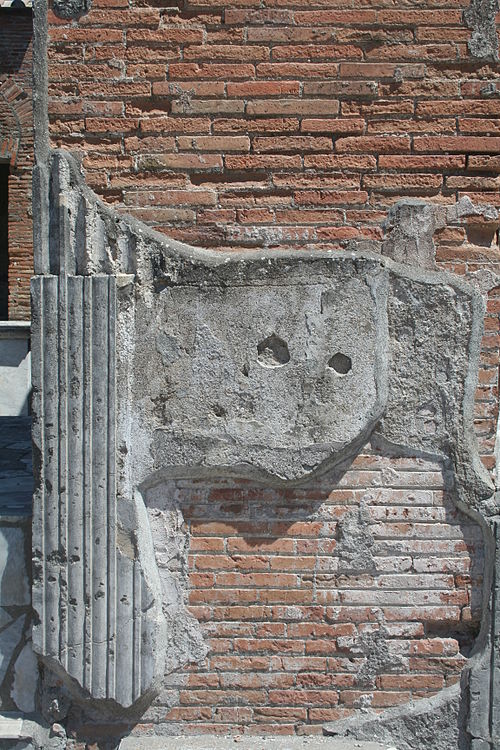Plasternoun
(uncountable) A paste applied to the skin for healing or cosmetic purposes.
Plasternoun
A small adhesive bandage to cover a minor wound; a sticking plaster.
Plasternoun
(uncountable) A mixture of lime or gypsum, sand, and water, sometimes with the addition of fibres, that hardens to a smooth solid and is used for coating walls and ceilings; render, stucco.
Plasternoun
(countable) A cast made of plaster of Paris and gauze; plaster cast.
Plasternoun
(uncountable) plaster of Paris.
Plasterverb
(transitive) To cover or coat something with plaster; to render.
Plasterverb
(transitive) To apply a plaster to.
Plasterverb
(transitive) To smear with some viscous or liquid substance.
Plasterverb
(transitive) To hide or cover up, as if with plaster; to cover thickly.
Plasterverb
To smooth over.
Plasternoun
An external application of a consistency harder than ointment, prepared for use by spreading it on linen, leather, silk, or other material. It is adhesive at the ordinary temperature of the body, and is used, according to its composition, to produce a medicinal effect, to bind parts together, etc.; as, a porous plaster; sticking plaster.
Plasternoun
A composition of lime, water, and sand, with or without hair as a bond, for coating walls, ceilings, and partitions of houses. See Mortar.
Plasternoun
Calcined gypsum, or plaster of Paris, especially when ground, as used for making ornaments, figures, moldings, etc.; or calcined gypsum used as a fertilizer.
Plasterverb
To cover with a plaster, as a wound or sore.
Plasterverb
To overlay or cover with plaster, as the ceilings and walls of a house.
Plasterverb
Fig.: To smooth over; to cover or conceal the defects of; to hide, as with a covering of plaster.
Plasternoun
a mixture of lime or gypsum with sand and water; hardens into a smooth solid; used to cover walls and ceilings
Plasternoun
any of several gypsum cements; a white powder (a form of calcium sulphate) that forms a paste when mixed with water and hardens into a solid; used in making molds and sculptures and casts for broken limbs
Plasternoun
a medical dressing consisting of a soft heated mass of meal or clay that is spread on a cloth and applied to the skin to treat inflamed areas or improve circulation etc.
Plasternoun
a hardened surface of plaster (as on a wall or ceiling);
Plasternoun
adhesive tape used in dressing wounds
Plasterverb
cover conspicuously, as by pasting something on;
Plasterverb
affix conspicuously;
Plasterverb
apply a plaster cast to;
Plasterverb
apply a heavy coat to
Plasterverb
coat with plaster;
Plasterverb
dress by covering with a therapeutic substance
Plaster
Plaster is a building material used for the protective or decorative coating of walls and ceilings and for moulding and casting decorative elements. In English, usually means a material used for the interiors of buildings, while commonly refers to external applications.
Screednoun
A piece or narrow strip cut or torn off from a larger whole; a shred.
Screednoun
A piece of land, especially one that is narrow.
Screednoun
A rent, a tear.
Screednoun
A piece of writing (such as an article, letter, or list) or a speech, especially if long.
Screednoun
(by extension) A speech or piece of writing which contains angry and extended criticism; a diatribe, a harangue.
Screednoun
Chiefly in the plural form screeds: a large quantity.
Screednoun
Senses relating to building construction and masonry.
Screednoun
A tool, usually a long strip of wood or other material, placed on a floor to be covered with concrete, a wall to be plastered, etc., as a guide for producing a smooth, flat surface.
Screednoun
A tool such as a long strip of wood or other material which is drawn over a wet layer of concrete, plaster, etc., to make it smooth and flat; also, a machine that achieves this effect; a screeder.
Screednoun
A smooth, flat layer of concrete, plaster, or similar material, especially if acting as a base for paving stones, tiles, wooden planks, etc.
Screednoun
A (discordant) sound or tune played on bagpipes, a fiddle, or a pipe.
Screednoun
The sound of something scratching or tearing.
Screedverb
To rend, to shred, to tear.
Screedverb
To read or repeat from memory fluently or glibly; to reel off.
Screedverb
To use a screed to produce a smooth, flat surface of concrete, plaster, or similar material; also (generally) to put down a layer of concrete, plaster, etc.
Screedverb
To become rent or torn.
Screedverb
To play bagpipes, a fiddle, or a pipe.
Screedverb
(intransitive) To make a discordant or harsh scratching or tearing sound.
Screedverb
To play (a sound or tune) on bagpipes, a fiddle, or a pipe.
Screedadjective
Strewn with scree.
Screednoun
A strip of plaster of the thickness proposed for the coat, applied to the wall at intervals of four or five feet, as a guide.
Screednoun
A fragment; a portion; a shred.
Screednoun
A breach or rent; a breaking forth into a loud, shrill sound; as, martial screeds.
Screednoun
An harangue; a long tirade on any subject.
Screednoun
a long monotonous harangue
Screednoun
a long piece of writing
Screednoun
an accurately levelled strip of material placed on a wall or floor as guide for the even application of plaster or concrete
Screed
Screed has three meanings in building construction: a flat board (screed board, floating screed) or a purpose-made aluminium tool used to smooth and to materials like concrete, stucco and plaster after they have been placed on a surface or to assist in flattening; a strip of plaster or wood applied to a surface to act as a guide for a screed tool (screed rail, screed strip, screed batten); the material itself which has been flattened with a screed (screed coat). In the UK, screed has also come to describe a thin, top layer of material (sand and cement, magnesite or calcium sulphate), poured in situ on top of the structural concrete or insulation, on top of which other finishing materials can be applied, or the structural material can be left bare to achieve a raw effect.






















